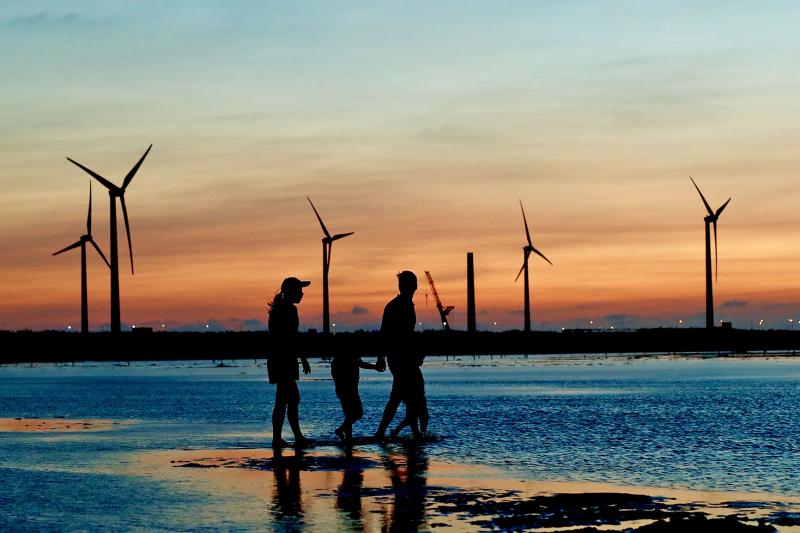China Steel Corp (中鋼), the nation’s largest steel maker, yesterday said that its board of directors approved a NT$5.51 billion (US$198.69 million) investment in a wind energy venture to embrace global carbon-neural trends.
The company plans to inject fresh capital into its offshore wind subsidiary, a joint venture with Denmark’s Copenhagen Infrastructure Partners.
The company’s 300 megawatt Chong Neng offshore wind farm (中能風場) is part of Taiwan’s second round of offshore wind development and is slated to join the grid in 2024.

Photo: EPA-EFE
In addition to the development of Chong Neng, China Steel is “actively pursuing steel material and construction opportunities in the offshore wind industry,” the company said.
“Our involvement in Chong Neng is a way of for us to participate in the formation of a Taiwanese supply chain in offshore wind,” it said.
China Steel boosted investment in Cheng Neng by NT$535 million in April.
The company has been looking to “meet world trends in embracing carbon neutrality” by investing in renewable energy projects, and is pushing to reduce emissions by 7 percent by 2025, the company said last month.
“We are optimistic about the mid and long-term development of the renewable energies industry,” it said.
China Steel on Tuesday posted pretax profit of NT$8.71 billion for last month, 4 percent less than July’s pretax profit of NT$9.08 billion.
That brought its cumulative pretax profit for the first eight months of the year to NT$52.997 billion, a surge of 1,447 percent from the same period last year.

US sports leagues rushed to get in on the multi-billion US dollar bonanza of legalized betting, but the arrest of an National Basketball Association (NBA) coach and player in two sprawling US federal investigations show the potential cost of partnering with the gambling industry. Portland Trail Blazers coach Chauncey Billups, a former Detroit Pistons star and an NBA Hall of Famer, was arrested for his alleged role in rigged illegal poker games that prosecutors say were tied to Mafia crime families. Miami Heat guard Terry Rozier was charged with manipulating his play for the benefit of bettors and former NBA player and

The DBS Foundation yesterday announced the launch of two flagship programs, “Silver Motion” and “Happier Caregiver, Healthier Seniors,” in partnership with CCILU Ltd, Hondao Senior Citizens’ Welfare Foundation and the Garden of Hope Foundation to help Taiwan face the challenges of a rapidly aging population. The foundation said it would invest S$4.91 million (US$3.8 million) over three years to foster inclusion and resilience in an aging society. “Aging may bring challenges, but it also brings opportunities. With many Asian markets rapidly becoming super-aged, the DBS Foundation is working with a regional ecosystem of like-minded partners across the private, public and people sectors

BREAKTHROUGH TECH: Powertech expects its fan-out PLP system to become mainstream, saying it can offer three-times greater production throughput Chip packaging service provider Powertech Technology Inc (力成科技) plans to more than double its capital expenditures next year to more than NT$40 billion (US$1.31 billion) as demand for its new panel-level packaging (PLP) technology, primarily used in chips for artificial intelligence (AI) applications, has greatly exceeded what it can supply. A significant portion of the budget, about US$1 billion, would be earmarked for fan-out PLP technology, Powertech told investors yesterday. Its heavy investment in fan-out PLP technology over the past 10 years is expected to bear fruit in 2027 after the technology enters volume production, it said, adding that the tech would

YEAR-END BOOST: The holiday shopping season in the US and Europe, combined with rising demand for AI applications, is expected to drive exports to a new high, the NDC said Taiwan’s business climate monitor improved last month, transitioning from steady growth for the first time in five months, as robust global demand for artificial intelligence (AI) products and new iPhone shipments boosted exports and corporate sales, the National Development Council (NDC) said yesterday. The council uses a five-color system to measure the nation’s economic state, with “green” indicating steady growth, “red” suggesting a boom and “blue” reflecting a recession. “Yellow-red” and “yellow-blue” suggest a transition to a stronger or weaker condition. The total score of the monitor’s composite index rose to 35 points from a revised 31 in August, ending a four-month